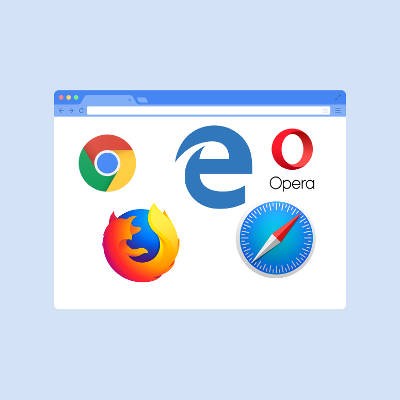Attend IT Blog
Tip of the Week: Which Browser Provides the Best Security?
For most users the Internet browser is one of the most utilized applications on their computer or mobile device. With the influx of aggressive problems, it is mighty useful to know which Internet browser is the best for keeping your data, identity, and network secure. Today, we will take a look at the five most popular Internet browsers found on desktop and laptop computers and decipher which are the most reliable.
A Look at the Cybersecurity Industry
Since the landscape of the Internet is rife with threats, the risks an organization faces by not doing all they can to protect their information systems presents real organizational issues. As a result, the Internet security industry has expanded so far as it will do annual revenues of over $170 billion by 2020, with the Internet of Things presenting an ongoing security issue for most businesses.
For one indicator that gives away just how risky the Internet is for an organization, check out how much money is being spent on securing computers and networks. To address the innumerable threats, cybersecurity markets have begun to pop up for gadgets, appliances, cars, and other frequently utilized goods. Moreover, cybersecurity insurance is now being offered by major insurers. PricewaterhouseCoopers forecasts that $7.5 billion will be spent on data insurance by 2020.
Another indicator that cybersecurity is prioritized by many businesses is how major financial institutions address these risks. Organizations like J.P. Morgan Chase, Bank of America, Citigroup, and Wells Fargo, with their breadth of risk-averse financial services, spend upwards of $1.5 billion per year on cybersecurity.
Get Started with Browser Security
The browser is generally the end point where the data stored on the Internet is disseminated to users. As a result, small businesses, who unlike major financial organizations (or most enterprise businesses), don’t have the financial resources to spare, have come to rely on their browser’s built-in security features to do a lot of the heavy lifting in their cybersecurity strategies. By understanding which browser gives you the best opportunity to succeed, you can be ahead of the game instead of constantly playing from a disadvantaged position and putting your data and network at risk.
Browsers
The most well-known browsers are the most utilized. Google’s Chrome, Apple’s Safari, Mozilla’s Firefox, and Microsoft’s new Edge browser are currently the most utilized browsers on computers that run Windows or macOS, while Chrome, Safari, and UCBrowser are most popular on mobile. We’ll take a look at some of these browsers (and their security features) to help you ascertain whether or not a particular browser will work for your needs.
The best protection is actually from producing secure connections. In the browser, any site that has a secure connection will feature the protocol “https://”. By encrypting data sent and received through the browser, it keeps the transmission of data from being intercepted, stolen, or leaked. In encrypting the exchange of information, it highlights the two variables that need to be present for secure browsing: identification and privacy.
We’ll go through the most popular browsers to see what they offer users in the way of security and privacy:
Google Chrome
Google Chrome is the most popular and utilized Internet browser in the world. For security’s sake, it features a powerful “sandbox”. The sandbox is an encrypted environment that attempts to keep the communication between the user and the website separate to offer another layer of security. Google also has the fastest response time to security vulnerabilities. One security problem users get into when using Chrome is if they use Chrome apps. The Chrome apps themselves may not be a vulnerability, but the more endpoints that potentially expose users, the higher the risk is.
Privacy in Google Chrome is another matter altogether. Google’s whole plan is to know as much as possible about each of their users, so privacy isn’t in the cards in that scenario. The complete lack of privacy you have in Chrome does provide some value to the user in the way of targeted advertisements, content, and more; but, if you are looking to stay off the grid, using Google Chrome isn’t going to facilitate that strategy at all.
Mozilla Firefox
Firefox’s usefulness is coming into question because of age. Firefox’s lack of a “sandbox” becomes a much bigger deal as more threats materialize, and more browsers utilize the technology. Firefox’s JavaScript plugins all share the same namespace, which can expose users that utilize them. In order to best utilize Firefox, understanding industry best practices and not diverting from them is suggested.
On the other hand, privacy in Firefox is the industry standard. Since it is open source software, and not tied to some major corporate entity, the not-for-profit’s software makes a point to protect the privacy of its users by not tracking or collecting much data at all.
Apple’s Safari
Apple had tried making Safari for other platforms, but they just couldn’t gain traction, so you’ll only find it as the default browser on every Apple product. For years, Apple’s claims that their products were the most secure held true, but today’s malware developers don’t ignore Safari any longer. Since macOS has become a target like any other computing platform, Apple has been extraordinarily good at providing timely patches and updates.
Apple is, like Google and Microsoft, tracking everything that you do in their software to help provide a better service. This obviously isn’t ideal for personal privacy, but on Apple’s devices, Safari is still the best functioning and most feature-rich browsing experience.
Opera
Developed before Microsoft launched Internet Explorer, Opera is the oldest browser on this list. Before it was retired, developers decided to overhaul the browser, and in 2013 they scrapped the proprietary engine that had run the software for the same engine that Chrome (and other browsers) use, Chromium. By adding the layer of security that comes with the Chromium sandbox, Opera has been able to sustain itself, and offers users security through obscurity.
Because of its obscure nature, privacy is less of an issue as well. They have a very conservative data collection policy which, despite the software not being open-sourced, does present users with privacy concerns some peace of mind.
Microsoft Edge and Internet Explorer
Since so many computer users use Windows, Microsoft's browsers generally are utilized, albeit with substantial frustration most of the time. The new Edge browser has replaced Internet Explorer and has enhanced security substantially. Time will tell if Microsoft’s browser will be a viable option for users, but currently Edge’s market share is middling. From a security standpoint the Edge browser utilizes the sandbox technology that the Chromium browsers do, and like Chrome, offers apps inside the software. The book is still out on Edge’s reliability and overall usability.
Privacy in Microsoft's browsers is pretty much not there as they have adhered to the growing trend of collecting every piece of data that they can. There are options to make it less transparent, but users should be happy that Edge isn’t IE.
Security in your browser is something you cannot do without, but you will have to choose between open source software that keeps your user information private, or a more popular and transparent software that will enhance the usability of the product. For more information about Internet browsers, contact us today at 020 8626 4485.

